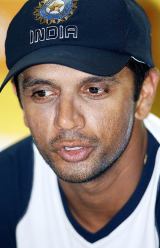The game's new conscience
Why the MCC's new committee matters
29-May-2007
|
|

|
If you were asked for one idea to improve international cricket, you probably wouldn't say: "Form a committee!" But that is what MCC have done, and it could turn out to be exactly what the game needs.
This isn't just any committee. It is the MCC World Cricket committee. Its members are all cricketers, present (Rahul Dravid) or past (the rest). They are all, apart from Dravid and now Andy Flower, currently detached from playing, coaching or, as far as I know, administration. In Britain, the sort of people who get asked on to committees tend to be referred to, a little wearily, as "the great and the good". Well, this lot are great and good.
Among them are great Test captains (Steve Waugh, Mike Brearley), leading commentators (Mike Atherton, Geoff Boycott), a well-loved umpire (David Shepherd, desperately hoping the committee-room clock won't reach 1.11), major figures in the English game (Atherton, Mike Gatting, Alec Stewart), and several men who are all-time greats from their respective countries (Dravid, Barry Richards, Courtney Walsh, Martin Crowe, Majid Khan, Andy Flower). The chairman is Tony Lewis, less of a star and more of an MCC insider than the rest, but eminently decent and wise. Around the table were many races, many varieties of cricketer, and a range of different ages. The only obvious omission was a woman: the dear old MCC are still not fully aware of the existence of half the human race.
The committee met for the third time in mid-May and issued two statements. The first one was all about Zimbabwe, the country Flower represented with great distinction, never more so than when he put on a black armband. The committee called for Zimbabwe to be "permanently suspended" from international cricket "until such time as the cricket infrastructure is rebuilt". The reason they gave is that the standard of cricket played by Zimbabwe has deteriorated. They were not asking ICC to make a political judgment, something Malcolm Speed purports to avoid. They were asking them to concede that Zimbabwe's cricket just isn't up to scratch.
So far, so wise - although the decision to devote one statement to Zimbabwe did backfire a bit, as the committee's other pronouncements, published six days later, attracted less coverage than they would have if they had all come out together. If you read them anyway, skip a paragraph. If you missed them, here they are, reduced to bullet points:
1. Bowling actions should be monitored in matches, not just in science labs.
2. There are too many international matches, especially one-dayers.
3. There should be a standard format for international tours - a Twenty20 "competition" (a rare moment of vagueness), three one-dayers and a Test series of three to five matches.
4. The World Cup should last no longer than a month, with fewer teams and "fewer one-sided matches".
5. Boundaries should go out again, to within two metres of the perimeter fence.
6. Groundsmen should stop using glue to hold pitches together.
Are they right? Let's go point by point again.
1. Probably. Monitoring during matches will be tricky, but if it can be done, it will have far more credibility.
2. Absolutely. Over-scheduling has done damage to everything from the World Cup's rarity value to a whole generation of fast bowlers.
3. Probably. The standard format is ingenious and appealing, although there should still be some two-Test series - England v West Indies, perhaps.
4. Absolutely. This World Cup had the whole cricket world crying out for less, to borrow the title of Christopher Martin-Jenkins' excellent piece on over-scheduling in the 2003 Wisden.
5. Probably, though I have a soft spot for the six-hitting you see today. There aren't THAT many of them, and this is the one place where the committee gives off a whiff of old fart. One or two of their members hit fewer sixes in their whole international careers than Shahid Afridi does in an hour.
6. Absolutely. Glueing pitches is a hideous practice. Cricket is essentially a game played with natural materials - leather, cork, willow, muscles, and brain. It ought to be a whole lot greener than it is, and glueing pitches should be barred for environmental reasons alone.
So: seven pronouncements, five of them spot-on, and two pretty close. They even show their independence by pointing out that the culprits with the glue include MCC itself. Whether anyone will listen remains to be seen, but the game has found a new conscience.
Tim de Lisle is a former editor of Wisden. His website is http://www.timdelisle.com